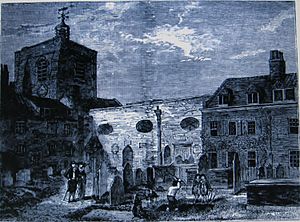John Bell (bishop of Worcester) facts for kids
Quick facts for kids The Right Reverend John Bell |
|
|---|---|
| Bishop of Worcester | |
| Church | Church of England |
| Province | York |
| Diocese | Worcester |
| In Office | 1539–1543 |
| Predecessor | Hugh Latimer |
| Successor | Nicholas Heath |
| Orders | |
| Consecration | 1539 |
| Personal details | |
| Died | 11 August 1556 Clerkenwell, London, Kingdom of England |
| Nationality | English |
| Denomination | Anglicanism |
| Education | University of Oxford |
| Alma mater | Balliol College |
John Bell (died 11 August 1556) was an important Bishop of Worcester from 1539 to 1543. He served during the time of Henry VIII of England, a king famous for changing England's religion.
Contents
Early Life and Education
John Bell studied at Balliol College, which is part of University of Oxford. Later, he also attended Cambridge University. In 1504, he earned a law degree there.
A Career in the Church and Law
After finishing his studies, John Bell held many important positions in the church and legal system. He was a church leader at St Stephen's Chapel in Westminster Palace. He also worked at churches in places like Stratford-Upon-Avon and Lincoln Cathedral.
Bell became an expert in both church law and civil law. He was even appointed by Cardinal Wolsey, a powerful figure, to a special court. In 1523, Bell questioned William Tyndale, who was accused of teaching ideas against the church.
Bell also went on missions for the king. One important trip was to Germany. His goal was to build a relationship between England and the Lutheran Princes there. While abroad, he earned another law degree, which was recognized at Oxford in 1531.
Helping King Henry VIII's Divorce
John Bell played a key role in what was called "The King's Great Matter." This was King Henry VIII's effort to divorce his first wife, Catherine of Aragon.
In 1531, a clever idea came from Thomas Cranmer. He suggested that the king's divorce would be stronger if universities supported it. So, King Henry VIII sent Dr. Bell, along with other important people, to Oxford University. Their job was to get the university to agree with the king's divorce.
Even though some people threw stones at them, Bell and his team succeeded. They got Oxford to support the king, despite strong opposition from younger university members.
In the same year, Bell worked with Thomas More to prepare a royal announcement. This announcement was against William Tyndale's English translation of the Bible. It also spoke out against other books that were considered to have wrong ideas.
In 1532, Bell was part of a church meeting that made a big decision. They decided that the king's marriage went against God's law. This meant the Pope's permission for the marriage was not valid. This meeting also created important rules about religion, which John Bell signed.
Bell also acted as the king's representative at a trial in 1533. This trial officially ended Henry's first marriage. This happened just in time for the coronation of Anne Boleyn, Henry's new wife.
In 1537, John Bell helped write an important religious book. It was called The Institution of the Christian Man, but it was often known as the Bishop's Book.
Becoming Bishop of Worcester (1539–1543)
In 1539, John Bell became the Bishop of Worcester. He took over from Hugh Latimer. Thomas Cranmer officially made him a bishop on August 17. That same year, Bell was present at the baptism of Edward VI of England, who would later become king.
Becoming bishop was a big challenge for Bell. Latimer, the previous bishop, had made many big changes. Bell worked hard to bring back order and balance to the area. He tried to fix things after Latimer's sudden changes.
In 1540, Bell was part of a group that declared King Henry VIII's marriage to Anne of Cleves illegal.
In 1541, Bell supported Archbishop Cranmer in the House of Lords. Cranmer was trying to pass a law to promote "true religion." However, this caused a lot of trouble with conservative groups. When Bell saw this, he stopped supporting Cranmer.
In 1542, church leaders decided to create a new translation of the New Testament. Bell was given the task of translating the first and second letters to the Thessalonians.
On November 17, 1543, John Bell resigned from his position as Bishop of Worcester. He received a pension and moved to Clerkenwell. He served as a priest there until his death.
Final Years and Legacy
John Bell spent his last years in London, serving as a priest in Clerkenwell. He passed away on August 11, 1556.
His funeral was a respectful event. He was buried on August 13 in Clerkenwell. He was dressed like a bishop, with his special hat and clothes. His funeral was lit by many torches and candles near the altar.
In his will, Bell left money to the poor of Clerkenwell and to Stratford-upon-Avon. He also gave money to a church in St Paul's Cathedral. He asked for prayers for his soul. Bell also helped his old college, Balliol College, Oxford. He provided money to support two students from the Worcester area.
People remembered Bishop Bell as a great speaker and a learned religious leader. He was also known as an honest and kind person.
 | Georgia Louise Harris Brown |
 | Julian Abele |
 | Norma Merrick Sklarek |
 | William Sidney Pittman |


